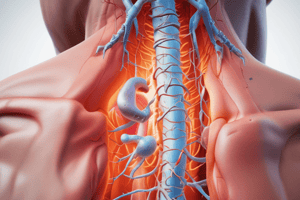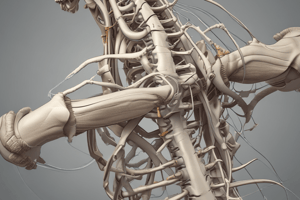Podcast
Questions and Answers
What is the primary reason for the patient's hip movement limitations?
What is the primary reason for the patient's hip movement limitations?
- Chronic degenerative changes
- Injury to the spine
- Age-related factors
- Muscle weakness limited by pain (correct)
Which of the following post-surgery precautions is NOT recommended?
Which of the following post-surgery precautions is NOT recommended?
- Wearing non-slip shoes
- Limiting prolonged sitting to 30 minutes
- Log roll out of bed
- Lifting more than 2 kgs (correct)
What does WBAT stand for in the context of mobilizing after surgery?
What does WBAT stand for in the context of mobilizing after surgery?
- Weight Bearing As Tolerated (correct)
- Weight Bearing And Traction
- Weight Bearing And Tension
- Weight Bearing At Time
In the sit-to-stand transfer, what is the recommended approach to avoid spinal twisting?
In the sit-to-stand transfer, what is the recommended approach to avoid spinal twisting?
What kind of assistance does the patient require during bed mobility?
What kind of assistance does the patient require during bed mobility?
How should a patient safely get out of bed post-surgery?
How should a patient safely get out of bed post-surgery?
What is the purpose of providing pain education for patients exhibiting fear avoidance behaviors?
What is the purpose of providing pain education for patients exhibiting fear avoidance behaviors?
What is one common challenge that patients face related to remembering post-surgery activity steps?
What is one common challenge that patients face related to remembering post-surgery activity steps?
What is the recommended timeframe before returning to play after an ACL reconstruction?
What is the recommended timeframe before returning to play after an ACL reconstruction?
Which exercise involves pushing down into a towel under the knee?
Which exercise involves pushing down into a towel under the knee?
What should be thought of as 'magnetic' to the operated leg?
What should be thought of as 'magnetic' to the operated leg?
What is the primary characteristic of the regression exercise listed for knee slides?
What is the primary characteristic of the regression exercise listed for knee slides?
Which phrase best describes the progression of the quad contraction exercise?
Which phrase best describes the progression of the quad contraction exercise?
What happens to bone bruising after surgery?
What happens to bone bruising after surgery?
What is the main goal for a patient post ACL reconstruction by the start of the season?
What is the main goal for a patient post ACL reconstruction by the start of the season?
Which exercise is suggested as the easiest and basic form of rehabilitation for the operated leg?
Which exercise is suggested as the easiest and basic form of rehabilitation for the operated leg?
What is the primary purpose of ankle pumps in the initial exercises post-surgery?
What is the primary purpose of ankle pumps in the initial exercises post-surgery?
Which of the following exercises is designed to target the gluteus medius?
Which of the following exercises is designed to target the gluteus medius?
What should a patient avoid doing with their legs during the first day post-surgery?
What should a patient avoid doing with their legs during the first day post-surgery?
What is recommended to reduce postoperative pain and swelling for an ACL surgery patient?
What is recommended to reduce postoperative pain and swelling for an ACL surgery patient?
Which procedure is essential for regaining knee function after ACL surgery?
Which procedure is essential for regaining knee function after ACL surgery?
In the rehabilitation process post-rotator cuff repair surgery, what is the main restriction during the first six weeks?
In the rehabilitation process post-rotator cuff repair surgery, what is the main restriction during the first six weeks?
Which exercise should be avoided in the early recovery period post-surgery for a full thickness RCT?
Which exercise should be avoided in the early recovery period post-surgery for a full thickness RCT?
What should be the immediate goal for knee flexion after ACL surgery?
What should be the immediate goal for knee flexion after ACL surgery?
Which of the following actions is critical to perform while getting dressed post-shoulder surgery?
Which of the following actions is critical to perform while getting dressed post-shoulder surgery?
What is the recommended progression for glute squeezes post-surgery?
What is the recommended progression for glute squeezes post-surgery?
What is a crucial post-operative instruction for patients with an anterior approach to hip surgery?
What is a crucial post-operative instruction for patients with an anterior approach to hip surgery?
Which exercise is not typically included in the first four weeks post-rotator cuff surgery?
Which exercise is not typically included in the first four weeks post-rotator cuff surgery?
What is the benefit of using SMART Goals in rehabilitation?
What is the benefit of using SMART Goals in rehabilitation?
Flashcards are hidden until you start studying
Study Notes
Case Study 1: LSF
- 70-year-old patient admitted for L1-L3 lumbar spine fusion (LSF).
- L1-L2 compression fracture with 20% canal compromise due to retro pulsed fragment and chronic degeneration observed.
- Previously independent, stair navigation at home required crutch instruction.
- Hip flexion and abduction range of motion (ROM) restricted by severe pain.
- Muscle weakness observed in all hip movements, primarily limited by pain, affecting walking and transfers.
Anatomy of Surgery
- Surgical procedure involves fusion of L1 to L3 vertebrae.
Day 1 Post-Surgery Precautions
- Weight restrictions: no lifting over 2 kgs.
- Avoid upper body twisting and excessive back extension or flexion.
- Ensure sitting is limited to 30 minutes, with instructions to log roll out of bed.
- Mandatory usage of non-slip shoes.
Bed Mobility Techniques
- Requires moderate assistance with log roll and sit to edge of bed.
- Pain reported at 4/10 during mobility tasks.
Weight Bearing as Tolerated (WBAT)
- WBAT allows control over weight distribution through lower limbs based on comfort.
- FASF (functional assistive support framework) provides upper limb support during mobility.
Sit to Stand & Chair Transfer
- Patient requires moderate assistance to transition from bed to chair.
- Emphasize large sweeping motions for transfers to avoid spinal twisting.
Pain and Fear Avoidance Education
- Emphasize the importance of gentle movement for recovery to reduce blood clots and discomfort.
- Use visual aids and demonstrations to support understanding of movements.
Exercises
- Focus on hip flexion and abduction, targeting pain-limited muscle strength.
- Introduce active resistance and ROM exercises including ankle pumps and knee bends.
Week 1 Post-Op Exercises
- Standing knee raises and hip abduction exercises focus on improving strength and mobility post-surgery.
Case Study 2: THR
- Patient remains independent with daily activities but slightly underweight.
- Weight-bearing as tolerated (WBAT) with moderate resting pain (5/10).
- Right hip movements affected by pain, extending to flexion and extension strength limitations.
Anatomy of Surgery
- Intracapsular neck of femur fracture corrected via posterior surgical approach, affecting surrounding musculature.
Day 1 Post-Surgery Precautions
- Maintain hips at a 90-degree angle, avoiding crossing legs.
- Limit internal and external hip rotations.
Bed Mobility Techniques
- Requires minimal assistance to sit up from lying position.
Weight Bearing as Tolerated (WBAT)
- Patient can progressively bear weight based on comfort.
Sit to Stand & Chair Transfer
- Moderate assistance provided during transfers.
Bed Exercises
- Glute squeezes to support circulation post-surgical intervention.
Week 1 Post-Op Exercises
- Emphasis on standing knee raises and hip extension exercises to facilitate recovery.
Case Study 3: RCR
- Injury acquired through a FOOSH mechanism (fall on outstretched hand), resulting in 4 months of work absence.
- Retraction of the supraspinatus muscle to the glenoid rim identified.
Anatomy of Surgery
- Full thickness rotator cuff tear repaired via open surgery, with a medium incision through the deltoid.
Post-Surgery Precautions
- Sling usage required 24/7 for 6 weeks, including specific motions to avoid.
- Maintain cleanliness and dryness of the surgical site.
Sling Information
- Use an abduction sling for 6 weeks, allowing for limited arm movement.
Rehabilitation Exercises
- Initial focus on pendulum swings and scapular depression exercises for strength and mobility.
Progression Timeline for Exercises
- Gradual introduction of active assisted range of motion (AAROM) exercises from weeks 5-8, advancing to more challenging movements by weeks 12-16.
Case Study 4: ACL Reconstruction
- 17-year-old patient undergoing rehabilitation post-ACL reconstruction, with a planned return to AFL in 8 months.
Anatomy of Surgery
- Utilization of a patella tendon graft; meniscectomy performed for horizontal tear repair.
Day 1 Post-Surgery Precautions
- Focus on keeping incisions clean and transitioning mobility to regain knee flexion and extension.
- Pain management with cryotherapy recommended.
Bed Mobility Techniques
- Moderate assistance required for transitioning from lying to sitting.
Sit to Stand & Weight Bearing
- Weight-bearing as tolerated (WBAT) to be managed with specific crutch movements.
Bed Exercises
- Initial exercises include quadriceps contractions and knee slides progressing to resisted flexion.
Week 1 Post-Op Exercises
- Strength program targeting knee recovery, ensuring proper joint mobility.
Return to AFL Advice
- Reinforce the importance of following recovery timelines for safe return to sports activities.
Studying That Suits You
Use AI to generate personalized quizzes and flashcards to suit your learning preferences.




